Category / REF Subjects
Latest CMWH newsletter online now
Our latest CMWH newsletter (autumn 2024 edition) is out now. Click here! 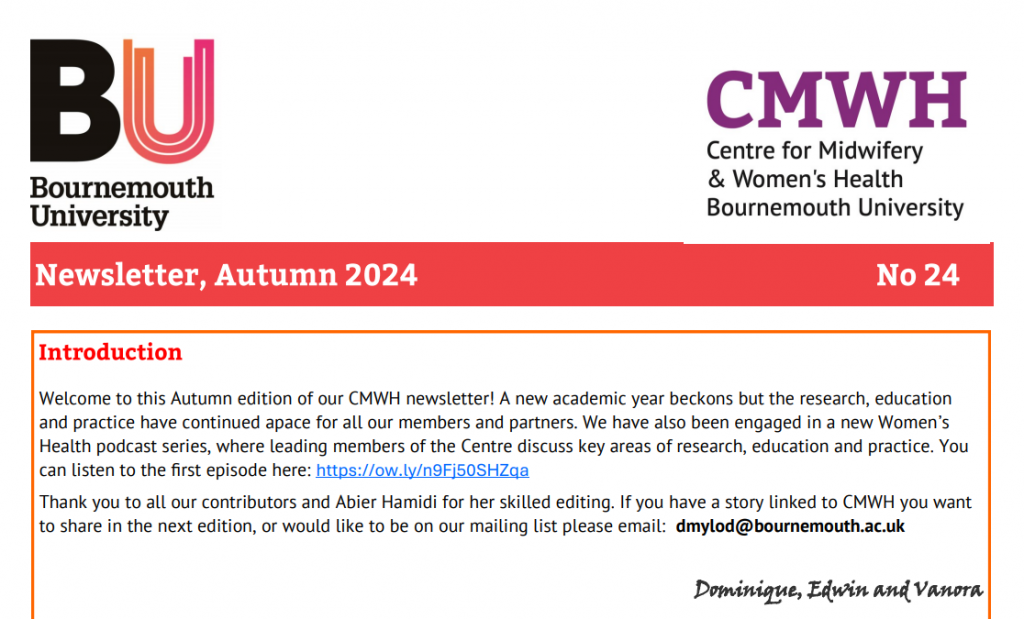 This edition includes news items and stories related the successes of CMWH staff and students. For example, about Drs. Dominique Mylod and Daisy Wiggins who both secured innovative NIHR funding for undergraduate student internships. Or about the recently awarded National Institute for Health and Care Research (NIHR) funding for ‘INSIGHT: Inspiring Students into Research’. This innovative three-year programme started this summer as part of the NIHR Academy’s portfolio of career support for health and social care professionals. The programme supports the NIHR aim to develop a highly skilled research workforce capable of advancing the best research which improves health and care, and benefits society and the economy.
This edition includes news items and stories related the successes of CMWH staff and students. For example, about Drs. Dominique Mylod and Daisy Wiggins who both secured innovative NIHR funding for undergraduate student internships. Or about the recently awarded National Institute for Health and Care Research (NIHR) funding for ‘INSIGHT: Inspiring Students into Research’. This innovative three-year programme started this summer as part of the NIHR Academy’s portfolio of career support for health and social care professionals. The programme supports the NIHR aim to develop a highly skilled research workforce capable of advancing the best research which improves health and care, and benefits society and the economy.
There is also an item on the importance of humour to stimulate interest and engagement with taboo women’s health topics. CMWH’s Rosie Harper, a PhD researcher and pelvic floor physiotherapist at University Hospitals Dorset NHS Foundation Trust has led a study with comedian and women’s health physiotherapist Elaine Miller and the results were published in Health Expectations. Elaine’s Instagram campaign ran daily for 3 months @gusset_grippers. And there are many more stories and announcements. The editors would like to thank Abier Hamidi for her excellent editorial support!
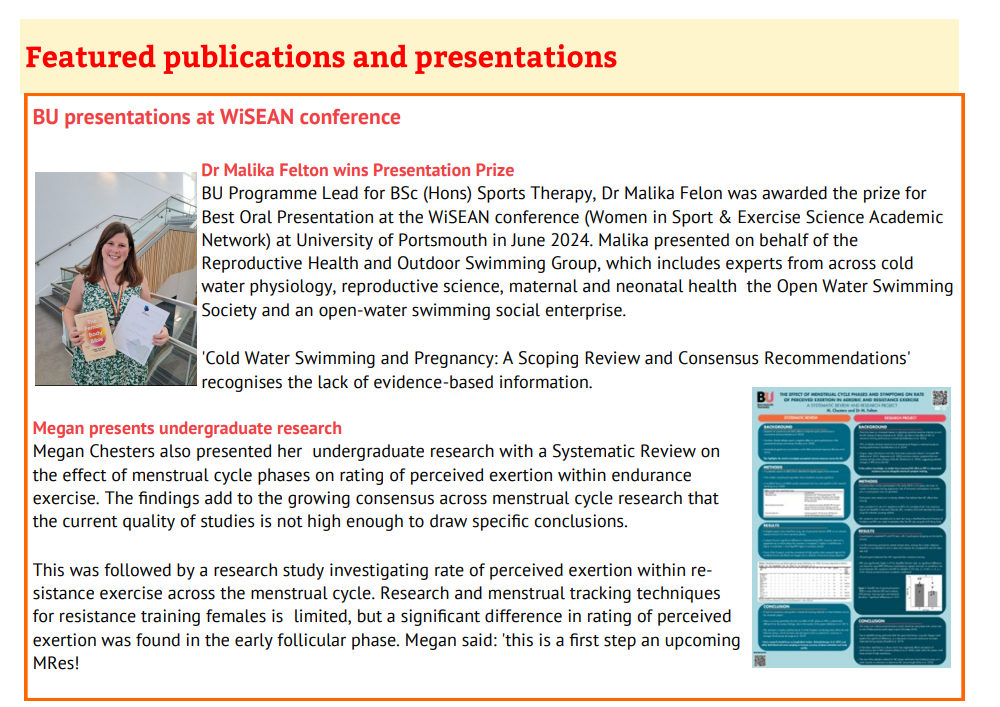
Reaching 10,000 reads!
Last Sunday ResearchGate informed us that the paper ‘Health facility preparedness of maternal and neonatal health services: a survey in Jumla, Nepal‘ [1] published in the international journal BMC Health Services Research had been read 10,000 times. In this paper, which is in an Open Access journal, Pasang reports on a cross-sectional study conducted in 2019 covering all 31 state health facilities in a district of Nepal to assess the availability of maternal and neonatal health services including appropriate workforce and access to essential medicines. 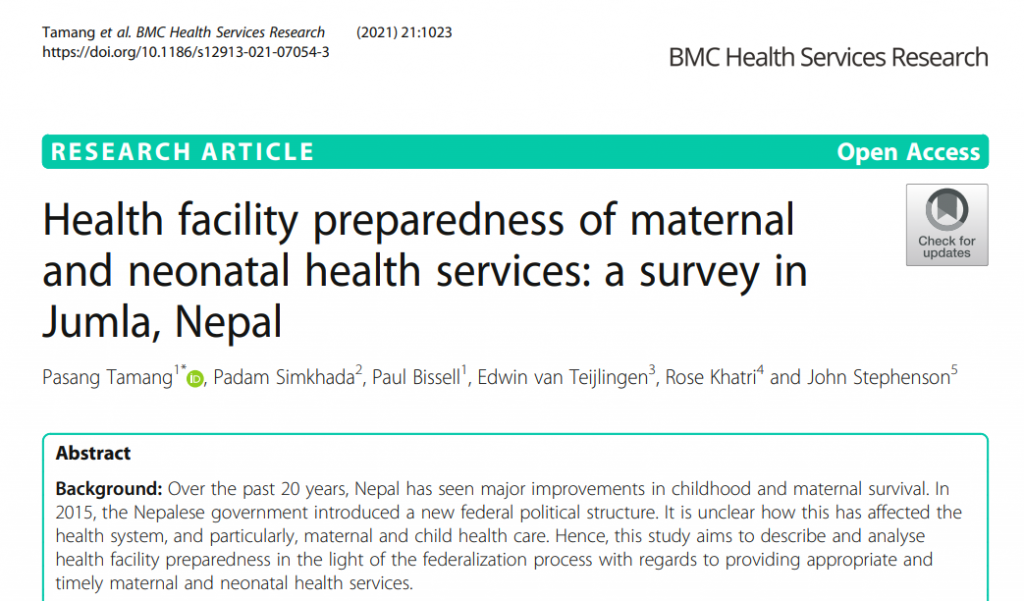 Tests of association between demographic factors and the probability of a facility experiencing a shortage of essential medicine within the last 3 months were also conducted as exploratory procedures. Overall health facilities reported better availability of staff than of drugs. The authors concluded that health facilities in Nepals should be supported to meet required minimal standards such as availability of essential medicines and the provision of emergency ambulance transport for women and newborns. This paper was part of Dr. Pasang Tamang’s Ph.D. project at the University of Huddersfield, which resulted in four other related publications [2-5]. Pasang is currently working as a Lecturer in Public Health in the School of Human Sciences at the University of Greenwich.
Tests of association between demographic factors and the probability of a facility experiencing a shortage of essential medicine within the last 3 months were also conducted as exploratory procedures. Overall health facilities reported better availability of staff than of drugs. The authors concluded that health facilities in Nepals should be supported to meet required minimal standards such as availability of essential medicines and the provision of emergency ambulance transport for women and newborns. This paper was part of Dr. Pasang Tamang’s Ph.D. project at the University of Huddersfield, which resulted in four other related publications [2-5]. Pasang is currently working as a Lecturer in Public Health in the School of Human Sciences at the University of Greenwich.

Prof. Edwin van Teijlingen

References:
- Tamang, P., Simkhada, P., Bissell, P., van Teijlingen, E., Khatri, R., Stephenson, J. (2021) Health facility preparedness of maternal and neonatal health services: A survey in Jumla, Nepal, BMC Health Service Research, 21:1023. https://rdcu.be/cyD01
- Tamang, P., Mahato, P., Simkhada P., Bissell, P., van Teijlingen, E. (2021) Pregnancy, Childbirth, Breastfeeding and Coronavirus Disease: What is known so far? Journal of Midwifery Association of Nepal (JMAN) 2(1): 96-101.
- Tamang, P., Simkhada, B, Simkhada, P., van Teijlingen, E. (2023) Quality of care in maternal and neonatal health in Jumla, rural Nepal: Women’s perspective. Fields: Journal of Huddersfield student research, 1(1). https://doi.org/10.5920/fields.1271
- Mahato, P., Tamang, P., Simkhada, B., Wasti, S. P., Devkota, B., Simkhada, P., van Teijlingen, E.R. (2022) Reflections on health promotion fieldwork in Nepal: Trials and tribulations. Journal of Health Promotion 10(1): 5–12. https://doi.org/10.3126/jhp.v10i1.50978
- Tamang, P., Mahato, P., Shahi, P., Simkhada, P., van Teijlingen, E., Amgain, K. (2020) COVID-19 Quarantine: A Key Part of Prevention in Nepal. Journal of Karnali Academy of Health Sciences 3(1):1-14.
GLOW poster presentation by CMWH’s Dr. Rebecca Neal
Dr. Rebecca Neal in the Centre for Midwifery & Women’s Health (CMWH) who has a poster accepted for presentation at the prestigious GLOW conference later this month. This poster ‘Heat resilience and midwives: Bridging the gap for women’s health in a changing global climate. The 2024 GLOW conference, supported by the Medical Research Council, will focus on the effects of the ongoing global crises of climate change, infectious diseases, mental health, and conflict and migration on women’s and newborn health.
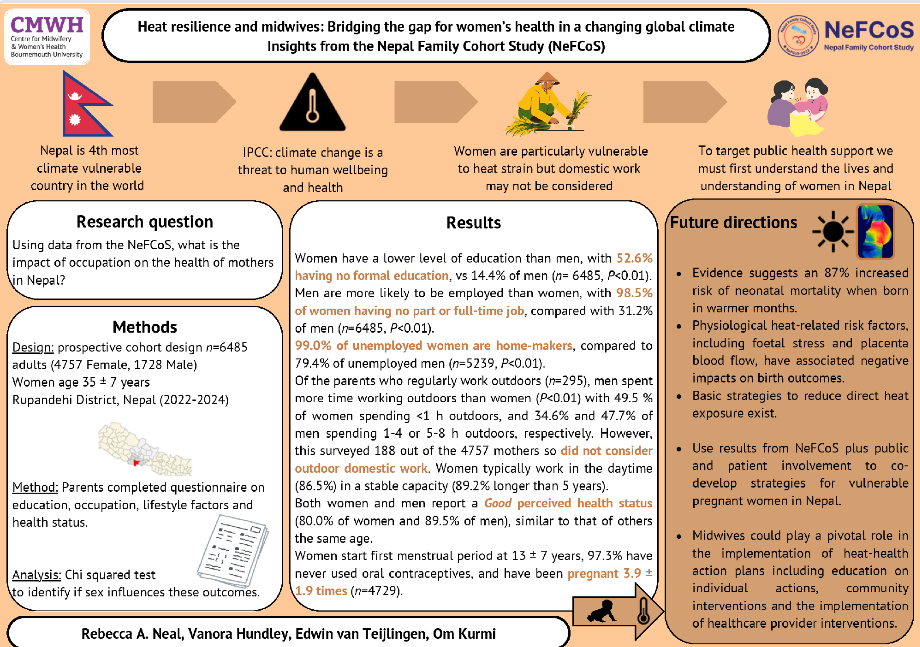 Insights from the Nepal Family Cohort Study (NeFCoS). NeFCoS is a multidisciplinary, longitudinal family cohort study designed to be one of its kind, informative research conducted in various geographical areas of Nepal. NeFCoS, led by Dr. Om Kurmi at the University of Coventry is part large-scale epidemiological study supported by BU and several other universities in the UK and elsewhere.
Insights from the Nepal Family Cohort Study (NeFCoS). NeFCoS is a multidisciplinary, longitudinal family cohort study designed to be one of its kind, informative research conducted in various geographical areas of Nepal. NeFCoS, led by Dr. Om Kurmi at the University of Coventry is part large-scale epidemiological study supported by BU and several other universities in the UK and elsewhere.

CWLTH Research Seminar
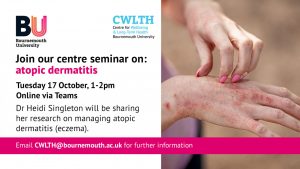
The Centre for Wellbeing and Long-Term Health (CWLTH) will be hosting its first virtual Research Seminar of the new academic year on Thursday 27th October at 13:00. Dr Heidi Singleton will be speaking about her systematic review of interventions for managing eczema. All are welcome to attend by clicking HERE. For more information about this meeting or for information about the CWLTH, please contact cwlth@bournemouth.ac.uk.
Art and Design: History, Practice and Theory academics – would you like to get more involved in preparing our next REF submission?
We are currently recruiting for an Output Champion to help support preparation for our next REF Submission to Art and Design: History, Practice and Theory. The deadline for expressions of interest is 11 October 2024.
This role is recruited through an open and transparent process, which gives all academic staff the opportunity to put themselves forward. Applications from underrepresented groups (e.g. minority ethnic, declared disability) are particularly welcome.
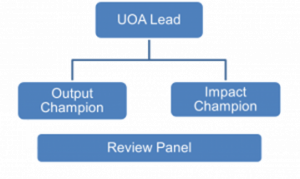
We are currently preparing submissions to thirteen units (otherwise known as UOAs). Each unit has a leadership team with at least one leader, an output and impact champion. The leadership team are supported by a panel of reviewers who assess the research from the unit. This includes research outputs (journal articles, book chapters, digital artefacts and conference proceedings) and impact case studies. We currently have vacancies in the following roles:
Output Champion – 32 – Art and Design: History, Practice and Theory
All roles require a level of commitment which is recognised accordingly with time to review, attend meetings, and take responsibility for tasks.
Undertaking a UOA role can be enjoyable and rewarding as two of our current champions testify:
“As UOA Outputs Champion you develop a detailed knowledge of all the great work that colleagues are doing related to the subject, and the different outlets used for disseminating their work. As an outputs committee member, you also get to know what research is going on across BU, and it’s interesting to see the differences between disciplines. It’s a good way develop your knowledge of the bigger picture of BU’s research, and also to understand the importance of REF and how it works in practice. You do spend quite a bit of time chasing colleagues to put their outputs on BRIAN for REF compliance but hopefully they forgive you!”
Professor Adele Ladkin – UOA 24 Output Champion
“As a UoA 17 impact champion, I work closely with the UoA 17 impact team to encourage the development of a culture of impact across BUBS. I try to pop into Department / research group meetings when I can to discuss impact, and I’ve enjoyed meeting people with a whole range of research interests. Sometimes it can be tough to engage people with impact – understandably; everyone is busy – so it’s important to be enthusiastic about the need for our BU research to reach the public. Overall, the role is about planting the seeds to get researchers thinking about the impact their work might have in the future (as well as the impact they have already had, sometimes without realising!)”
Dr Rafaelle Nicholson – UOA 17 Impact Champion
How to apply
All those interested should put forward a short case (suggested length of one paragraph) as to why they are interested in the role and what they think they could bring to it. These should be clearly marked with the relevant role and unit and emailed to ref@bournemouth.ac.uk by 5pm on 1 March 2024
Further detail on the role and the process of recruitment and selection criteria can be found here:
Process and criteria for selection
For further information please contact ref@bournemouth.ac.uk, a member of the current UOA Team or your Deputy Dean Research and Professional Practice with queries.
Upcoming BU systematic review training
 With the upcoming Bournemouth University systematic review module co-ordinated lead by Prof. Vanora Hundley, the following announcement was timely today:
With the upcoming Bournemouth University systematic review module co-ordinated lead by Prof. Vanora Hundley, the following announcement was timely today:
Your article reached 400 reads
The systematic review course is part of the INSIGHT programme.![]()
Reference:
-
van Teijlingen, E. R., Simkhada, B., Ireland, J.C., Simkhada, P. P., Bruce, J. (2012). Evidence-based health care in Nepal: The importance of systematic reviews. Nepal Journal of Epidemiology, 1(4), 114–118. https://doi.org/10.3126/nje.v1i4.5498
Insights from the Alan Turing Institute Data Study Group
Stepping into the world of data science at the Alan Turing Institute (ATI) Data Study Group from September 9-13, 2024 was an exhilarating experience. As the national institute for data science, the ATI’s strong connections to academia and industry set the stage for a week of intensive collaboration and problem-solving.
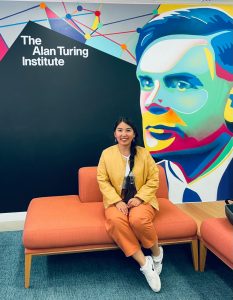
Joining the Transport for London (TfL) project within the hackathon-style event, I found myself amidst an eclectic team of 11 individuals, each bringing a unique set of skills and backgrounds to the table. The project’s challenge of identifying physical assets on the London Underground from point cloud data presented a thrilling opportunity to apply our collective expertise to a real-world problem.
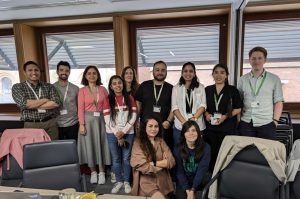
The task at hand was no small feat – analysing point cloud data to pinpoint key track features along the London Underground network. With collected image data, our goal was to automate the detection and classification of critical track components such as sleepers, rails, signalling equipment, and more. Our team’s approach was multifaceted, involving rigorous preprocessing, segmentation model training, and advanced data analysis techniques. By leveraging tools like U-Net and SAM 2 for image segmentation and employing post-processing methods to extract valuable insights from the predicted masks, we made strides towards achieving our objectives.

As an individual who recently completed a PhD thesis on “Complex Urban Road Networks: Static Structures and Dynamic Processes,” this opportunity to apply my research expertise in a practical setting was both challenging and rewarding. The seamless blend of academic knowledge and hands-on problem-solving during the ATI Data Study Group not only expanded my technical skills but also reinforced the importance of interdisciplinary collaboration in tackling complex data challenges.
Thanks to The Alan Turing Institute, especially TuringDSG organisers for an incredible opportunity. I would like to extend my gratitude to my PhD supervisor Dr. Wei Koong Chai for supporting my professional and personal development.
Assemgul Kozhabek (Computing Department, SciTech )
Kidney disease in migrant workers from Nepal
 Twenty reads may not look a lot, but this paper on kidney disease in Nepalese migrant workers was only published in the second half of last month. Our paper ‘Exploring lifestyles, work environment and health care experience of Nepalese returnee labour migrants diagnosed with kidney-related problems’ [1] resulted from a study funded by UK-based charity The Colt Foundation.
Twenty reads may not look a lot, but this paper on kidney disease in Nepalese migrant workers was only published in the second half of last month. Our paper ‘Exploring lifestyles, work environment and health care experience of Nepalese returnee labour migrants diagnosed with kidney-related problems’ [1] resulted from a study funded by UK-based charity The Colt Foundation.
One of the problems with kidney disease is that damage might be inflicted over a long period before people experience serious symptoms, as they might not show until the kidneys are working on less than half their capacity and long-term permanent damage has been done. This study indicates that Nepalese migrant workers face numerous challenges, including limited access to clean water and sanitation facilities, poor diets, exposure to occupational hazards, and overuse of pain medication, all of which may contribute to an increased risk of kidney disease.
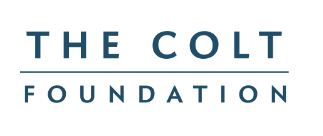 The paper is Open Access, and hence freely available to everybody with internet access. Our faculty of Health & Social Sciences team (Dr. Nirmal Aryal, Dr. Pramod Remi & Prof. Edwin van Teijlingen) has written many scientific papers (as well as a few Viewpoint articles) on a wide-range of aspects related to the health and well-being of migrant workers [2-33], our co-authors include former BU staff members Dr. Preeti Mahato, Dr. Bibha Simkhada, Dr. Shovita Adhikari Dhakal, Dr. Steve Trenoweth, Dr. Steve Keen, Dr. Zoe Sheppard and former BU PhD student Pratik Adhikary.
The paper is Open Access, and hence freely available to everybody with internet access. Our faculty of Health & Social Sciences team (Dr. Nirmal Aryal, Dr. Pramod Remi & Prof. Edwin van Teijlingen) has written many scientific papers (as well as a few Viewpoint articles) on a wide-range of aspects related to the health and well-being of migrant workers [2-33], our co-authors include former BU staff members Dr. Preeti Mahato, Dr. Bibha Simkhada, Dr. Shovita Adhikari Dhakal, Dr. Steve Trenoweth, Dr. Steve Keen, Dr. Zoe Sheppard and former BU PhD student Pratik Adhikary.
Dr. Pramod Regmi, Dr. Nirmal Aryal & Prof. Edwin van Teijlingen
References:
- Regmi P, Aryal N, Bhattarai S, Sedhain A, K. C. RK, van Teijlingen E (2024) Exploring lifestyles, work environment and health care experience of Nepalese returnee labour migrants diagnosed with kidney-related problems. PLoS ONE 19(8): e0309203. https://doi.org/10.1371/journal.pone.0309203
- Simkhada, P.P., van Teijlingen, E., Gurung, M., Bhujel, S., Wasti, S.P. (2024) Workplace harassment faced by female Nepalese migrants working aboard, Global Health Journal (accepted) https://www.sciencedirect.com/science/article/pii/S241464472400040X
- Aryal, N., Regmi, P., Adhikari Dhakal, S., Sharma, S., van Teijlingen, E. (2024) Moral panic, fear, stigma, and discrimination against returnee migrants and Muslim populations in Nepal: analyses of COVID-19 media content, Journal of Media Studies, 38(2):71-98. http://111.68.103.26/journals/index.php/jms/article/viewFile/7846/4025
- Chaudhary MN, Lim V-C, Faller EM, Regmi P, Aryal N, Mohd Zain SN, Azman AS, Sahimin B. (2024) Assessing the basic knowledge and awareness of dengue fever prevention among migrant workers in Klang Valley, Malaysia. PLoS ONE 19(2): e0297527. https://doi.org/10.1371/journal.pone.0297527
- Khanal, S.P., van Teijlingen, E., Sharma, M., Acharya, J., Sharma, C., Kharel, S., Gaulee, U., Bhattarai, K., Pasa, R.B., Bohora, P. (2024) Risk Perception and Protective Health Measure Regarding COVID-19 among Nepali Labour Migrants’ Returnee from India. KMC Journal, 6(1): 313–330. https://doi.org/10.3126/kmcj.v6i1.62364
- Gyawali, K., Simkhada, P., van Teijlingen, E.R., Manandhar, S., Silwal, R.C. (2023). Sexual Harassment Among Nepali Non-Migrating Female Partners of International Labor Migrant Men. Journal of Health Promotion, 11(1): 22–31. https://www.nepjol.info/index.php/jhp/article/view/61198
- Chaudhary MN, Lim V-C, Sahimin N, Faller EM, Regmi P, Aryal N, Azman AS (2023) Assessing the knowledge of, attitudes towards, and practices in, food safety among migrant workers in Klang Valley, Malaysia, Travel Medicine and Infectious Disease doi: https://doi.org/10.1016/j.tmaid.2023.102620.
- Manandhar, S., Simkhada, P., Brown, P., van Teijlingen, E. (2023) Impact of Men’s Labour Migration on Non-migrating Spouses’ Health: A Systematic Review, Qeios, July 16, https://www.qeios.com/read/BX9WFC.2
- Adhikari, Y.R., Regmi, P.R., Devkota, B., van Teijlingen, E.R. (2022) Forgotten health and social care needs of left-behind families of Nepali migrant workers. Journal of Health Promotion, 10(1):1–4. https://doi.org/10.3126/jhp.v10i1.50976
- Khatri, R., van Teijlingen, E., Simkhada, P. (2022) The health and well-being of female labour migrants from: A qualitative study of stakeholder views, Europasian Journal of Medical Sciences (EJMS) accepted
- Aryal, N., Sedhain, A., Regmi, P.R., KC, R.K.,& van Teijlingen, E. (2021). Risk of kidney health among returnee Nepali migrant workers: A survey of nephrologists. Asian Journal of Medical Sciences, 12(12), 126–132.
- Aryal, N., Regmi, P.R., Sedhain, A., KC, R.K., Martinez Faller, E., Rijal, A., van Teijlingen, E. (2021) Kidney health risk of migrant workers: An issue we can no longer overlook. Health Prospect 20(1):15-7
- Khanal, S. P., van Teijlingen, E., Sharma, M. K., Acharya, J., & Sharma, S. (2021). Perceived threats towards COVID-19 pandemic among Nepali migrant workers returned from India. Journal of Health Promotion,9(01), 87–99.
- Aryal, N., Regmi, P.R., van Teijlingen, E., Trenoweth, S., Adhikary, P., Simkhada, P. (2020) The Impact of Spousal Migration on the Mental Health of Nepali Women: A Cross-Sectional Study, International Journal of Environmental Research & Public Health 17(4), 1292; https://doi.org/10.3390/ijerph17041292
- Adhikary, P., Aryal, N., Dhungana, R.R., KC, R.K., Regmi, P.R., Wickramage, K.P., Duigan, P., Inkochasan, M., Sharma, G.N., Devkota, B., van Teijlingen, E., Simkhada, P. (2020) Accessing health services in India: experiences of seasonal migrants returning to Nepal. BMC Health Services Research 20, 992. https://doi.org/10.1186/s12913-020-05846-7
- Regmi, P., Aryal, N., van Teijlingen, E., Adhikary, P. (2020) Nepali migrant workers and the need for pre-departure training on mental health: a qualitative study, Journal of Immigrant & Minority Health 22, 973–981.
- Adhikary, P. van Teijlingen, E. (2020) Support networks in the Middle East & Malaysia: A qualitative study of Nepali returnee migrants’ experiences, International Journal of Occupational Safety & Health (IJOSH), 9(2): 31-35.
- Simkhada, B., Sah, R.K., Mercel-Sanca, A., van Teijlingen, E., Bhurtyal, Y.M., Regmi, P. (2020) Health and Wellbeing of the Nepali population in the UK: Perceptions and experiences of health and social care utilisation, Journal of Immigrant & Minority Health 23(2): 298–307.
- OM [International Organization for Migration]. (2019) Health vulnerabilities of cross-border migrants from Nepal. Kathmandu: International Organization for Migration.
- Regmi, P., van Teijlingen, E., Mahato, P., Aryal, N., Jadhav, N., Simkhada, P., Syed Zahiruddin, Q., Gaidhane, A., (2019) The health of Nepali migrants in India: A qualitative study of lifestyles and risks, Journal of Environmental Research & Public Health 16(19), 3655; doi:10.3390/ijerph16193655.
- Dhungana, R.R., Aryal, N, Adhikary, P., KC, R., Regmi, P.R., Devkota, B., Sharma, G.N., Wickramage, K., van Teijlingen, E., Simkhada, P. (2019) Psychological morbidity in Nepali cross-border migrants in India: A community-based cross-sectional, BMC Public Health 19:1534 https://bmcpublichealth.biomedcentral.com/articles/10.1186/s12889-019-7881-z
- Aryal, N., Regmi, P.R., van Teijlingen, E., Simkhada, P., Mahato, P. (2019) Adolescents left behind by migrant workers: a call for community-based mental health interventions in Nepal. WHO South East Asia Journal of Public Health 8(1): 38-41.
- Aryal, N., Regmi, P.R., Faller, E.M,, van Teijlingen, E., Khoon, C.C., Pereira, A., Simkhada, P. (2019) ‘Sudden cardiac death and kidney health related problems among Nepali migrant workers in Malaysia’ Nepal Journal of Epidemiology 9(3): 755-758. https://www.nepjol.info/index.php/NJE/article/view/25805
- Adhikary P, van Teijlingen E., Keen S. (2019) Workplace accidents among Nepali male workers in the Middle East and Malaysia: A qualitative study, Journal of Immigrant & Minority Health 21(5): 1115–1122. https://link.springer.com/article/10.1007/s10903-018-0801-y
- Simkhada, P.P., van Teijlingen, E.R., Gurung, M., Wasti, S. (2018) A survey of health problems of Nepalese female migrants workers in the Middle-East & Malaysia, BMC International Health & Human Rights 18(4): 1-7. http://rdcu.be/E3Ro
- Adhikary P, Sheppard, Z., Keen S., van Teijlingen E. (2018) Health and well-being of Nepalese migrant workers abroad, International Journal of Migration, Health and Social Care 14(1): 96-105. https://doi.org/10.1108/IJMHSC-12-2015-0052
- Adhikary, P., Sheppard, Z., Keen, S., van Teijlingen, E. (2017) Risky work: Accidents among Nepalese migrant workers in Malaysia, Qatar and Saudi, Health Prospect 16(2): 3-10.
- Simkhada, P.P., Regmi, P.R., van Teijlingen, E., Aryal, N. (2017) Identifying the gaps in Nepalese migrant workers’ health and well-being: A review of the literature, Journal of Travel Medicine 24 (4): 1-9.
- Aryal, N., Regmi, P.R., van Teijlingen, E., Simkhada, P., Adhikary, P., Bhatta, Y.K.D., Mann, S. (2016) Injury and Mortality in Young Nepalese Migrant Workers: A Call for Public Health Action. Asian-Pacific Journal of Public Health 28(8): 703-705.
- Sapkota, T., Simkhada, P., van Teijlingen, E. (2014) Nepalese health workers’ migration to United Kingdom: A qualitative study. Health Science Journal 8(1):57-74.
- Adhikary P, Keen S and van Teijlingen E (2011). Health Issues among Nepalese migrant workers in the Middle East. Health Science Journal.5(3):169-i75 DOI: 2-s2.0-79960420128.
- van Teijlingen E, Simkhada, P., Adhikary, P. (2009) Alcohol use among the Nepalese in the UK BMJ Rapid Response: www.bmj.com/cgi/eletters/339/oct20_1/b4028#223451
- Adhikary, P., Simkhada, P.P., van Teijlingen E., Raja, AE. (2008) Health & Lifestyle of Nepalese Migrants in the UK, BMC International Health & Human Rights 8(6). Web address: www.biomedcentral.com/1472-698X/8/6
Understand what hate crime and discriminatory abuse are and how best to respond to them
Over the summer, Jane Healy (Principle Academic in Criminology at Bournemouth University) led an inter-disciplinary research team at Bournemouth University and Royal Holloway which has conducted a survey to evaluate approaches to safeguarding adults who experience hate crime and discriminatory abuse.
Responses were received from across the UK, identifying challenges and providing examples of good practice. We are keen to share these findings as widely as possible.
The team are hosting a webinar where they will outline the context of hate crime and discriminatory abuse and discuss the anonymised findings and next steps, in a free online event on Tuesday 22 October 2024, from 12pm to 13:30pm.
Please click on this link to reserve your tickets: Exploring restorative practice approaches to safeguarding adults Tickets, Tue 22 Oct 2024 at 12:00 | Eventbrite
Please forward to anyone who might be interested in learning more about hate crime and discriminatory abuse, and the research findings.
We look forward to seeing you all at the online event.
Jane Healy and team
New editorial Nepal Journal Epidemiology out now
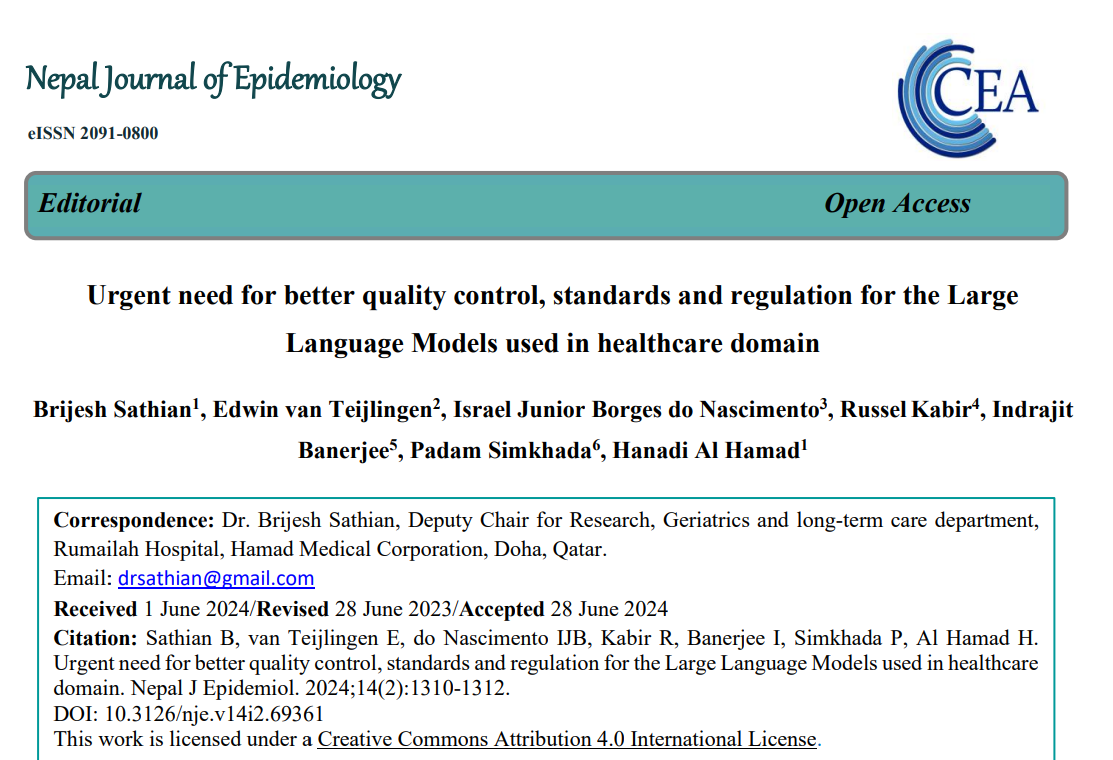 A few days ago we published the editorial for the latest issues of the Nepal Journal of Epidemiology. This editorial under the title ‘Urgent need for better quality control, standards and regulation for the Large Language Models used in healthcare domain‘ [1] comments that current methodologies for ensuring AI (Artificial Intelligence) technology’s safety and efficacy may be adequate for earlier AI iterations predating generative artificial intelligence (GAI). However, better clinical gouvernance GAI may necessitate the development of novel regulatory frameworks. As AI technology advances, researchers, academic institutions, funding bodies, and publishers should continue to examine its impact on scientific inquiry and revise their understanding, ethical guidelines, and regulations accordingly.
A few days ago we published the editorial for the latest issues of the Nepal Journal of Epidemiology. This editorial under the title ‘Urgent need for better quality control, standards and regulation for the Large Language Models used in healthcare domain‘ [1] comments that current methodologies for ensuring AI (Artificial Intelligence) technology’s safety and efficacy may be adequate for earlier AI iterations predating generative artificial intelligence (GAI). However, better clinical gouvernance GAI may necessitate the development of novel regulatory frameworks. As AI technology advances, researchers, academic institutions, funding bodies, and publishers should continue to examine its impact on scientific inquiry and revise their understanding, ethical guidelines, and regulations accordingly.
The co-authors include two Bournemouth University Visiting Faculty, Prof. Padam Simkhada (based at the University of Huddersfield) and Dr. Brijesh Sathian (based at Rumailah Hospital, Qatar).
Prof. Edwin van Teijlingen
CMWH

Reference:
- Sathian, B., van Teijlingen, E., do Nascimento, I. J. B., Kabir, R., Banerjee, I., Simkhada, P., & Al Hamad, H. (2024). Urgent need for better quality control, standards and regulation for the Large Language Models used in healthcare domain. Nepal Journal of Epidemiology, 14(2), 1310–1312. https://doi.org/10.3126/nje.v14i2.69361
Congratulations to BU Visiting Faculty Dr Ans Luyben
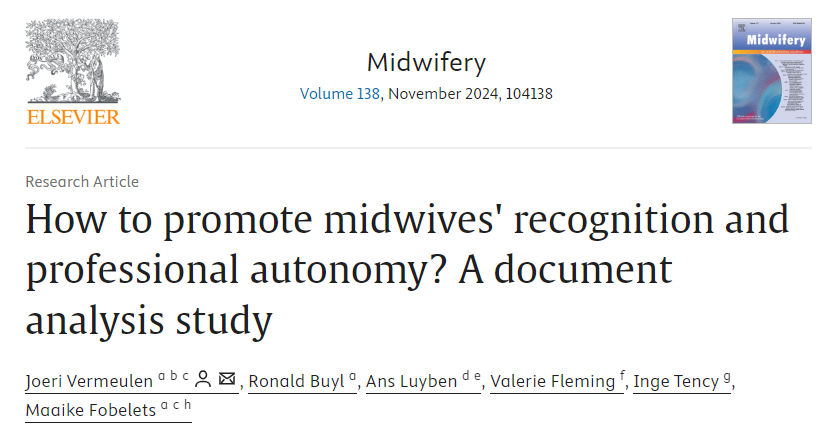 Congratulations to Dr. Ans Luyben on the publication of her latest midwifery article ‘How to promote midwives’ recognition and professional autonomy? A document analysis study’ [1]. This latest paper will appear in the forthcoming November issue of the international scientific journal Midwifery, published by Elsevier.
Congratulations to Dr. Ans Luyben on the publication of her latest midwifery article ‘How to promote midwives’ recognition and professional autonomy? A document analysis study’ [1]. This latest paper will appear in the forthcoming November issue of the international scientific journal Midwifery, published by Elsevier.
 The paper identified challenges in Belgian midwives’ recognition and professional autonomy and provided recommendations to address them, emphasizing the importance of recognized authority in midwifery. Implementing these recommendations can positively impact midwives’ recognition and autonomy in Belgium as well as in other countries. Ans has long been affiliated with the Centre of Midwifery & Women’s Health (CMWH) as Visiting Faculty and she works in the Frauenzentrum (Centre for Women’s Health), Lindenhofgruppe, Bern, Switzerland.
The paper identified challenges in Belgian midwives’ recognition and professional autonomy and provided recommendations to address them, emphasizing the importance of recognized authority in midwifery. Implementing these recommendations can positively impact midwives’ recognition and autonomy in Belgium as well as in other countries. Ans has long been affiliated with the Centre of Midwifery & Women’s Health (CMWH) as Visiting Faculty and she works in the Frauenzentrum (Centre for Women’s Health), Lindenhofgruppe, Bern, Switzerland.

Well done!
Prof. Edwin van Teijlingen
Reference:
- Vermeulen, J., Buyl, R., Luyben, A., Fleming, V., Tency, I., Fobelets, M. (2024) How to promote midwives’ recognition and professional autonomy? A document analysis study Midwifery, 138: 104138.
Successful human-centred design workshop at Safety 2024 in India

Last week colleagues from our Sonamoni project co-hosted a workshop with TGI Australia (The George Institute for Global Health) at the 15th World Conference on Injury Prevention and Safety Promotion (Safety 2024) which was held in New Delhi (India). Focusing on the strengths of the Human-Centred Design (HCD) approach, this workshop first introduced the design principles to participants and demonstrated how they can be employed to reduce risks and prevent accidents. These design principles have been applied for many years in designing consumer products and, more recently, in the fields of health and social systems. 
In this well-attended workshop researchers presented case studies from Bangladesh (including the Sonamoni project) and Tanzania to illustrate how the process is employed with communities to co-develop interventions aimed at reducing the risk of drowning among fishing folk and vulnerable children. ![]() The team proposed a framework which integrates HCD methodology and traditional research methodologies, creating a more user-centred and multidimensional approach to intervention design. Outputs of the process included user risk journeys, stakeholder mapping and systems diagrams that can be used with communities and wider stakeholders to visualise the problem and bring to life the environment in which interventions are to be designed. These outputs can also be support advocacy and donor engagement.
The team proposed a framework which integrates HCD methodology and traditional research methodologies, creating a more user-centred and multidimensional approach to intervention design. Outputs of the process included user risk journeys, stakeholder mapping and systems diagrams that can be used with communities and wider stakeholders to visualise the problem and bring to life the environment in which interventions are to be designed. These outputs can also be support advocacy and donor engagement.
 The proposed framework provides a mechanism for closer collaboration between researchers, practitioners, and communities to work together to co-design context-specific solutions that are culturally and environmentally appropriate. Workshop participants were asked for their expert opinion on the proposed framework, to help us refine the framework and inform future practice.
The proposed framework provides a mechanism for closer collaboration between researchers, practitioners, and communities to work together to co-design context-specific solutions that are culturally and environmentally appropriate. Workshop participants were asked for their expert opinion on the proposed framework, to help us refine the framework and inform future practice.
Our Sonamoni project recently had its own video recording on YouTube. 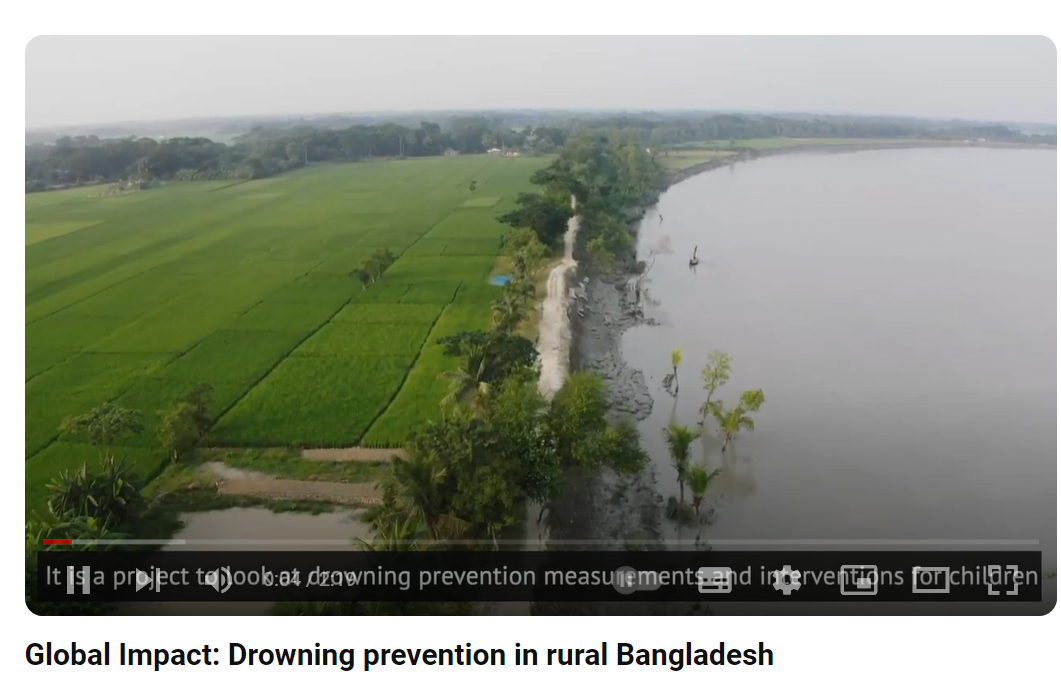 Sonamoni is a public health project is funded by the National Institute for Health and Care Research (NIHR) through its Research and Innovation for Global Health Transformation programme. For more information, visit the NIHR website.
Sonamoni is a public health project is funded by the National Institute for Health and Care Research (NIHR) through its Research and Innovation for Global Health Transformation programme. For more information, visit the NIHR website.  Sonamoni is coordinated by Bournemouth University in collaboration with Centre for Injury Prevention and Research, Bangladesh (CIPRB), the University of the West of England, Bristol, the University of Southampton, the Royal National Lifeboat Institution (RNLI), and design Without Borders (DWB) Africa.
Sonamoni is coordinated by Bournemouth University in collaboration with Centre for Injury Prevention and Research, Bangladesh (CIPRB), the University of the West of England, Bristol, the University of Southampton, the Royal National Lifeboat Institution (RNLI), and design Without Borders (DWB) Africa.
Prof. Edwin van Teijlingen
Centre for Midwifery & Women’s Health
Drowning prevention poster at Safety 2024 (in India)
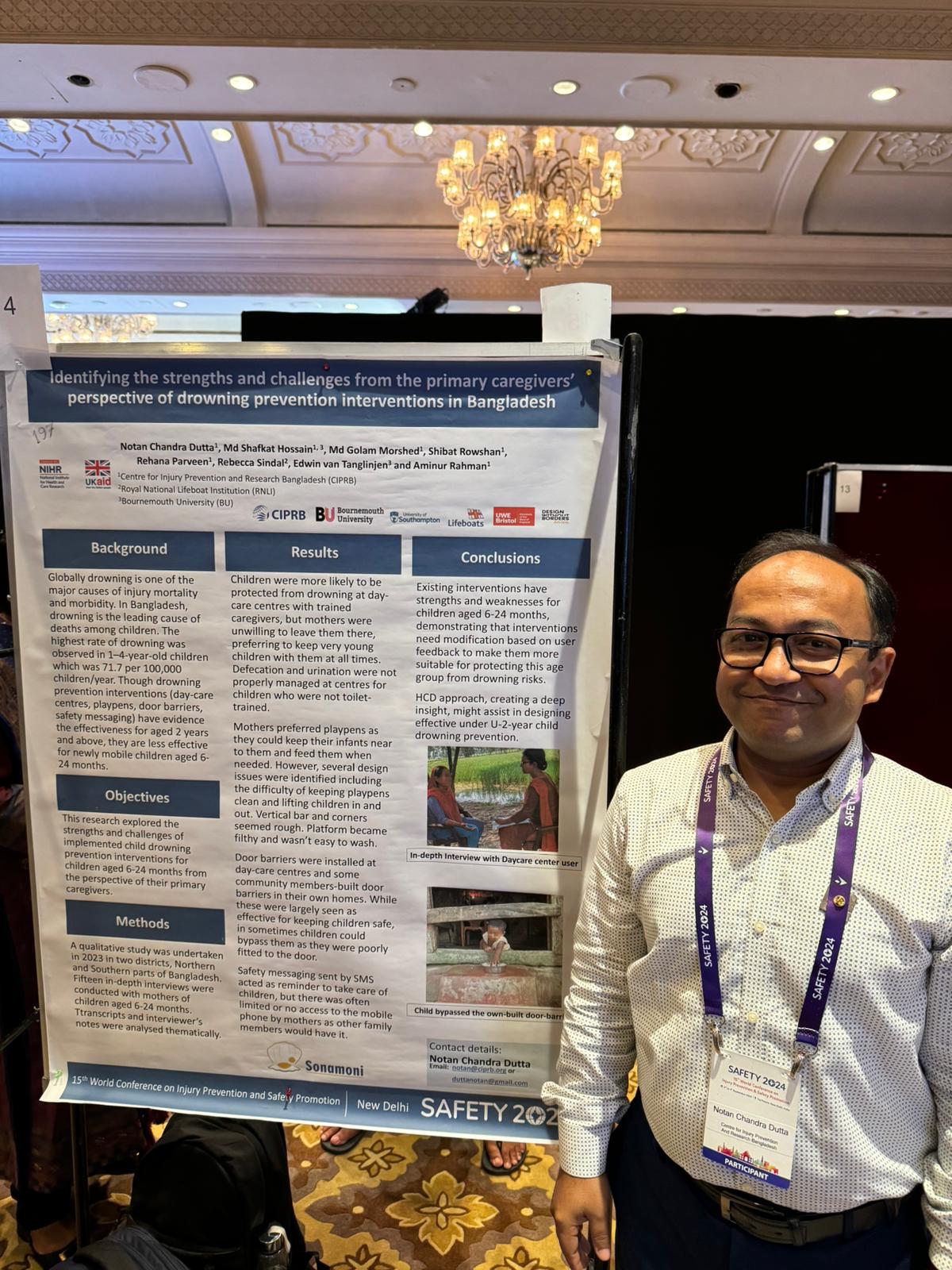 This week Notan Dutta, from our collaborating research organisation CIPRB (Centre for Injury Prevention and Research Bangladesh) presented a poster on ‘Identifying the strengths and challenges from the perspective of primary caregivers of drowning prevention interventions in Bangladesh’ at the 15th World Conference on Injury Prevention & Safety Promotion (Safety 2024). One of the co-authors of this poster presentation is Bournemouth University’s PhD student Md. Shafkat Hossain. Shafkat also attended the conference in India. Shafkat was in Delhi funded by Bloomberg Philanthropies as part of its Emerging Leaders in Drowning Prevention programme.
This week Notan Dutta, from our collaborating research organisation CIPRB (Centre for Injury Prevention and Research Bangladesh) presented a poster on ‘Identifying the strengths and challenges from the perspective of primary caregivers of drowning prevention interventions in Bangladesh’ at the 15th World Conference on Injury Prevention & Safety Promotion (Safety 2024). One of the co-authors of this poster presentation is Bournemouth University’s PhD student Md. Shafkat Hossain. Shafkat also attended the conference in India. Shafkat was in Delhi funded by Bloomberg Philanthropies as part of its Emerging Leaders in Drowning Prevention programme.  This initiative brings together a cohort of younger leaders to join national and international efforts to raise awareness and strengthen solutions and political commitment towards drowning.
This initiative brings together a cohort of younger leaders to join national and international efforts to raise awareness and strengthen solutions and political commitment towards drowning.
Our research into drowning prevention of under two-year old children in rural Bangladesh is funded by the National Institute for Health and Care Research (NIHR) through their Research and Innovation for Global Health Transformation programme.  For more information about our ongoing collaborative research in Bangladesh, please see the NIHR website. This is an interdisciplinary project between Bournemouth University, CIPRB, the RNLI (Royal National Lifeboat Institute), the University of the West of England, the University of the West of England, and Design Without Borders (DWB) in Uganda.
For more information about our ongoing collaborative research in Bangladesh, please see the NIHR website. This is an interdisciplinary project between Bournemouth University, CIPRB, the RNLI (Royal National Lifeboat Institute), the University of the West of England, the University of the West of England, and Design Without Borders (DWB) in Uganda.
Prof. Edwin van Teijlingen & Dr. Mavis Bengtsson
Centre for Midwifery & Women’s Health
Paper with a difference
 Last night ResearchGate informed us that our paper ‘Understanding health education, health promotion and public health‘ had reached 6,000 reads [1]. This reflective paper in an Open Access journal tries to bring a little more clarity in the confusion around the difference between the concepts of health education, health promotion and public health. We argue that such confusion does not limit itself to the individual terms but also to how these terms relate to each other. Some authors and public health practitioners use terms such as health education and health promotion interchangeably; others see them clearly as different concepts.
Last night ResearchGate informed us that our paper ‘Understanding health education, health promotion and public health‘ had reached 6,000 reads [1]. This reflective paper in an Open Access journal tries to bring a little more clarity in the confusion around the difference between the concepts of health education, health promotion and public health. We argue that such confusion does not limit itself to the individual terms but also to how these terms relate to each other. Some authors and public health practitioners use terms such as health education and health promotion interchangeably; others see them clearly as different concepts. 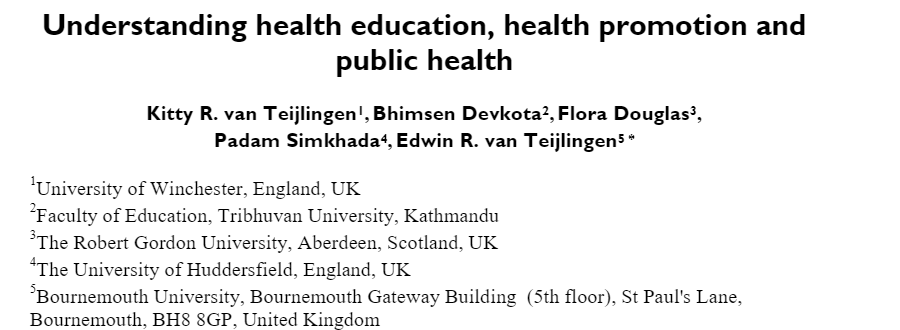
In this theoretical overview paper, we have first of all outlined our understanding of these individual terms. We suggest how the five principles of health promotion as outlined by the World Health Organization (WHO) fit into Andrew Tannahill’s model from 2009 [2] of three overlapping areas: (a) health education; (b) prevention of ill health; and (c) health protection. Our schematic overview places health education within health promotion and health promotion itself in the center of the overarching disciplines of education and public health. We hope our representation helps reduce confusion among all those interested in our discipline, including students, educators, journalists, practitioners, policymakers, politicians, and researchers.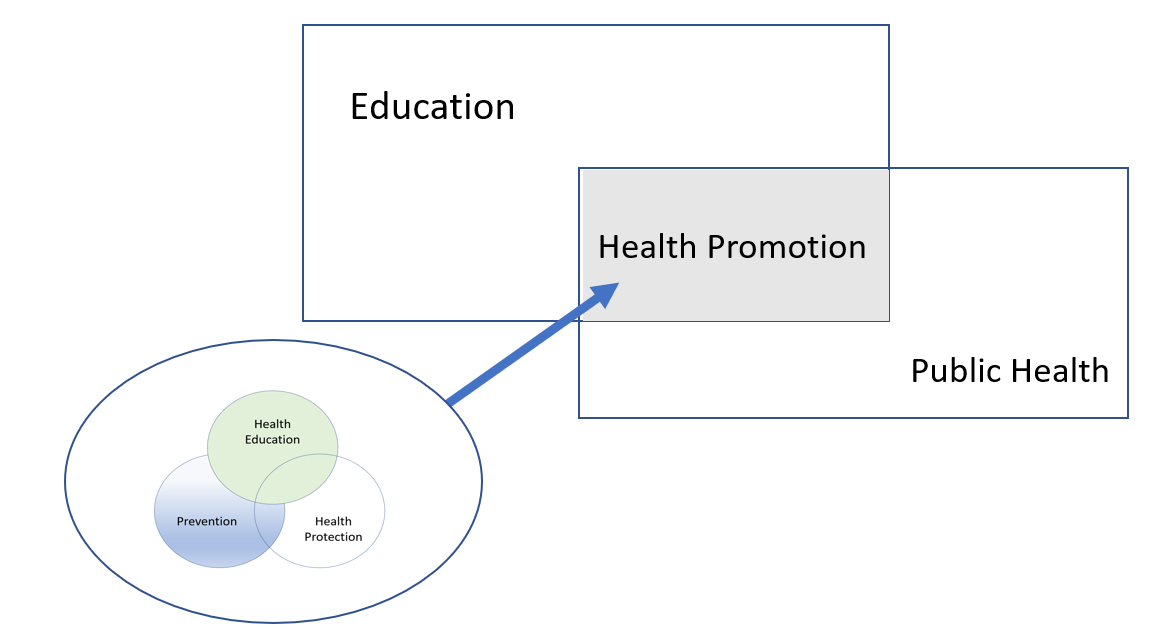
The paper is co-authored by a primary school teacher based in Dorset, and four professors who have a combined experience in the wider public health field of over a century.
Prof. Edwin van Teijlingen
Centre for Midwifery & Women’s Health

References:
- van Teijlingen, K., Devkota, B., Douglas, F., Simkhada, P., van Teijlingen, E. (2021) Understanding health education, health promotion and public health, Journal of Health Promotion 9(1):1-7.
- Tannahill, A. (2009). Health promotion: The Tannahill model revisited. Public Health, 123(5),396-399. doi: https://doi.org/10.1016/j.puhe.2008.05.021
Meeting about collaborative research in Nepal
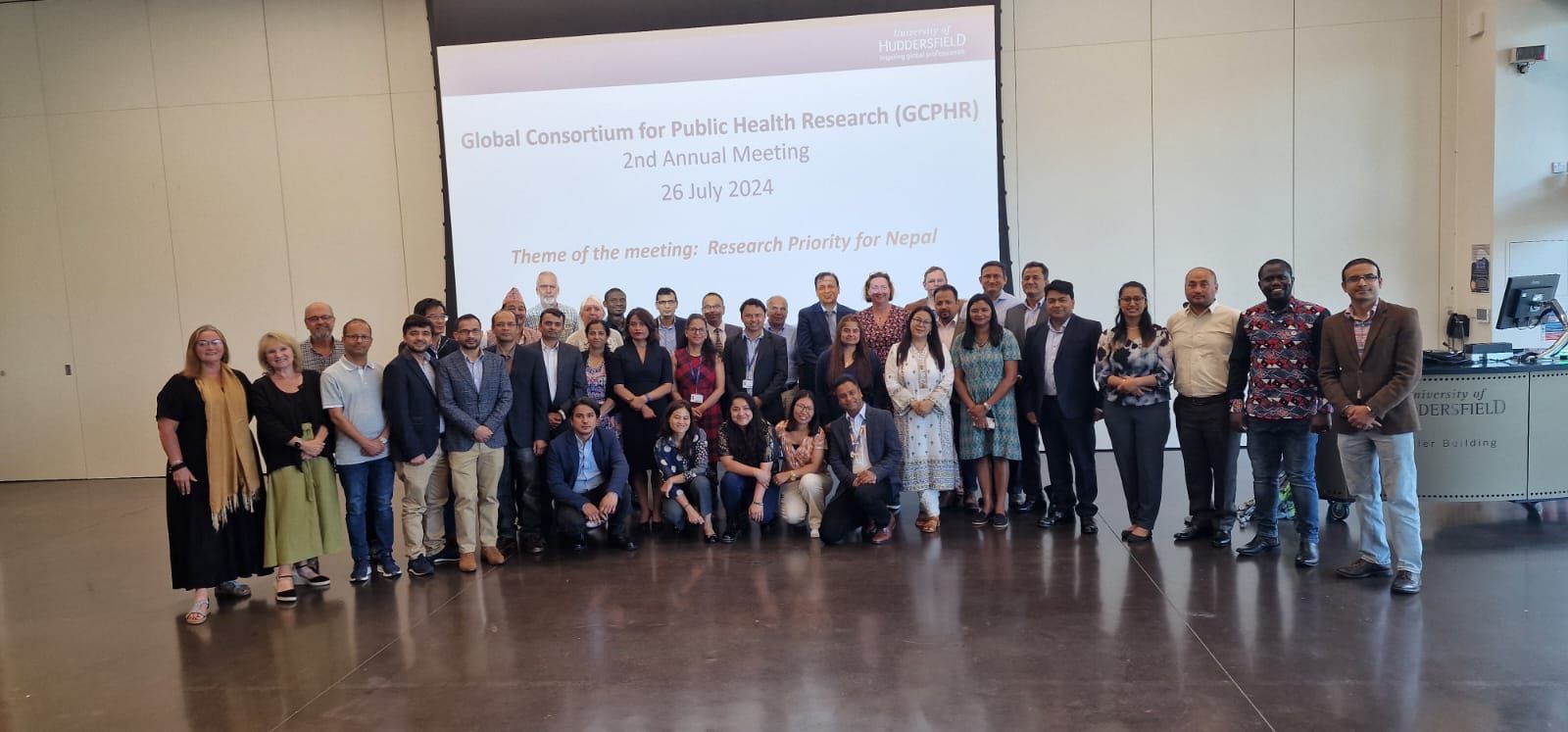 The University of Huddersfield recently hosted the 2nd annual meeting for the Global Consortium for Public Health Research (GCPHR), with the theme ‘Research Priority in Nepal’. A lovely write-up of the even just appeared online (click here to read this). Among its invited international delegates were Dr. Pramod Regmi (Centre for Wellbeing & Long-Term Health) and Prof. Edwin van Teijlingen (Centre for Midwifery & Women’s Health). GCPHR is led by Prof Padam Simkhada, Professor of Global Health and Associate Dean (International) of the School of Human & Health Sciences at the University of Huddersfield as well as Visiting Professor in the Faculty of Health & Social Sciences at Bournemouth University. This interdisciplinary event was funded by funded by the University of Huddersfield’s PVC International’s International collaborative fund (ICF).
The University of Huddersfield recently hosted the 2nd annual meeting for the Global Consortium for Public Health Research (GCPHR), with the theme ‘Research Priority in Nepal’. A lovely write-up of the even just appeared online (click here to read this). Among its invited international delegates were Dr. Pramod Regmi (Centre for Wellbeing & Long-Term Health) and Prof. Edwin van Teijlingen (Centre for Midwifery & Women’s Health). GCPHR is led by Prof Padam Simkhada, Professor of Global Health and Associate Dean (International) of the School of Human & Health Sciences at the University of Huddersfield as well as Visiting Professor in the Faculty of Health & Social Sciences at Bournemouth University. This interdisciplinary event was funded by funded by the University of Huddersfield’s PVC International’s International collaborative fund (ICF).
After the event BU’s Dr. Pramod Regmi reminded us that: “It is important to meet up in person, especially for larger international and interdisciplinary research projects. There is only so much you can do online in meeting.” There is a great advantage of online meetings by Zoom, Teams or Google Meet, especially when working with countries like Nepal. Not least of course in reducing our global carbon footprint. Of course, such meeting help academics to build and maintain research contacts across the globe, but it is not the same as sitting in the same room with someone and share ideas over coffee.
MaGMap: Mass Grave Mapping

Mapping projects related to mass atrocities and human rights violations are prevalent across the globe. Despite their often well-intentioned origins, there has been minimal practical research and subsequent output focused on what constitutes effective mapping. Furthermore, there is a lack of guidance on how to balance the pursuit of justice with the need to protect victims and affected communities. This raised an essential question: where, when and under what circumstances should mapping of mass graves be avoided or kept secret so that protection is not jeopardised?
In 2022, Professor Melanie Klinkner and Dr Ellie Smith secured Leverhulme funding to address this critical question. As of August 30th, 2024, the project’s output has been completed and is now available as an open-access resource for global use. The output is accessible both online and in a physical format, consisting of a comprehensive workbook accompanied by a set of removable tools designed to guide practitioners through the mapping process. These tools include:
- Mapping Process Flowchart: The flowchart illustrates the life cycle of a mass grave, highlighting the key stages and considerations at each step, all guided by the protection of rights.
- Mapping Decision Tree: Accompanying the flowchart, the decision tree highlights concerns and necessary actions that must be addressed before progressing with mapping at each stage.
- Risk Register: This element assists in decision-making processes by enabling logging and evaluations of risks and subsequent mitigation strategies.
Upon completion of the research Dr Ellie Smith outlines that:
“Mapping mass graves in an open-source format has the potential to provide longer-term protection of the site, as well as a means of countering revisionism, but is not without risks. The aim of our MaGMap tools is to enable anyone involved in mass grave mapping to do so in a way that is safe for survivors, witnesses and the families of victims, and preserves the integrity of the site as a crime scene”.
For Professor Melanie Klinkner the finalisation of these resources means that:
“Theoretical, transferable foundations have been laid to inform continued research and current mapping of atrocity practices. In fact, much of what we have learned during the course of the project now guides our own approach to building a regularised global mass grave map. This is significant: it will enable us to fully appraise the scale and magnitude of mass graves across the world in a rights-compliant and safe manner”.
Dr Ellie Smith will be presenting the findings of MaGMap this week at the European Society of International Law Conference in Lithuania.
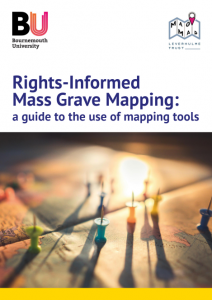
Congratulations to Heidi Singelton & Steve Ersser
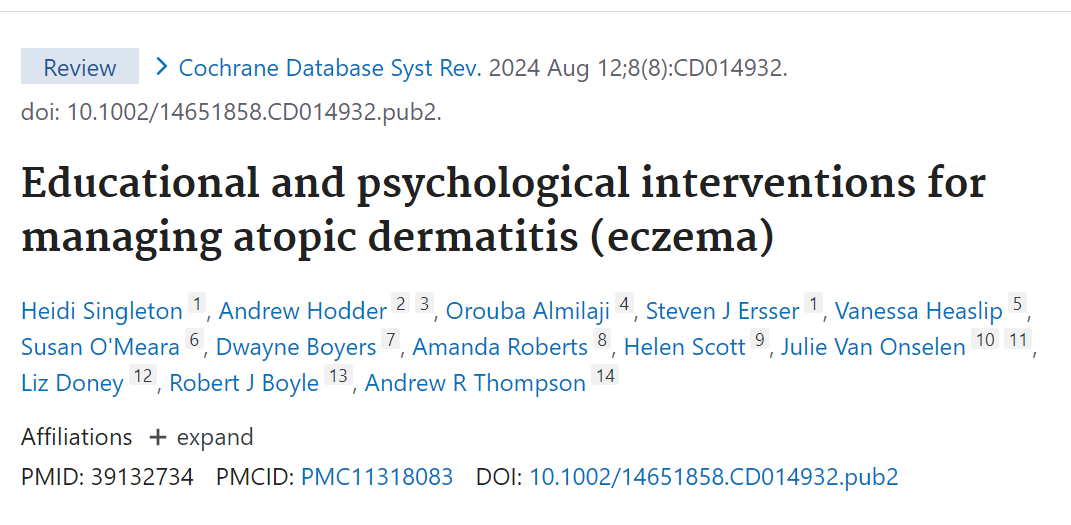 In late August Heidi Singleton led the publication of a Cochrane Systematic Review under the title ‘Educational and psychological interventions for managing atopic dermatitis (eczema)’ [1]. The team conducting this review includes BU’s Prof. Steve Ersser, University Hospitals Dorset NHS Foundation Trust colleagues Dr. Andrew Hodder, former BU staff Prof. Vanessa Heaslip (currently at the University of Salford), and one of my co-authors on a previous project Dr. Dwayne Boyers from the Health Economics Research Unit at the University of Aberdeen.
In late August Heidi Singleton led the publication of a Cochrane Systematic Review under the title ‘Educational and psychological interventions for managing atopic dermatitis (eczema)’ [1]. The team conducting this review includes BU’s Prof. Steve Ersser, University Hospitals Dorset NHS Foundation Trust colleagues Dr. Andrew Hodder, former BU staff Prof. Vanessa Heaslip (currently at the University of Salford), and one of my co-authors on a previous project Dr. Dwayne Boyers from the Health Economics Research Unit at the University of Aberdeen.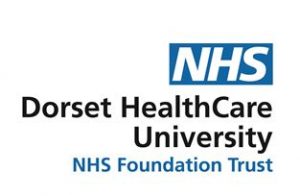
In their review the authors conclude that in-person, individual education, as an adjunct to conventional topical therapy, may reduce short-term eczema signs compared to standard care, but there is no information on eczema symptoms, quality of life or long-term outcomes. Group education probably reduces eczema signs and symptoms in the long term and may also improve quality of life in the short term. Favourable effects were also reported for technology-mediated education, habit reversal treatment and arousal reduction therapy. All favourable effects are of uncertain clinical significance, since they may not exceed the minimal clinically important difference (MCID) for the outcome measures used. Finally, they found no trials of self-help psychological interventions, psychological therapies or printed education. Future trials should include more diverse populations, address shared priorities, evaluate long-term outcomes and ensure patients are involved in trial design.
Well done!
Prof. Edwin van Teijlingen
CMWH
Reference:
- Singleton, H., Hodder, A., Almilaji, O., Ersser, S. J., Heaslip, V., O’Meara, S., Boyers, D., Roberts, A., Scott, H., Van Onselen, J., Doney, L., Boyle, R. J., & Thompson, A. R. (2024). Educational and psychological interventions for managing atopic dermatitis (eczema). The Cochrane database of systematic reviews, 8(8), CD014932. https://doi.org/10.1002/14651858.CD014932.pub2

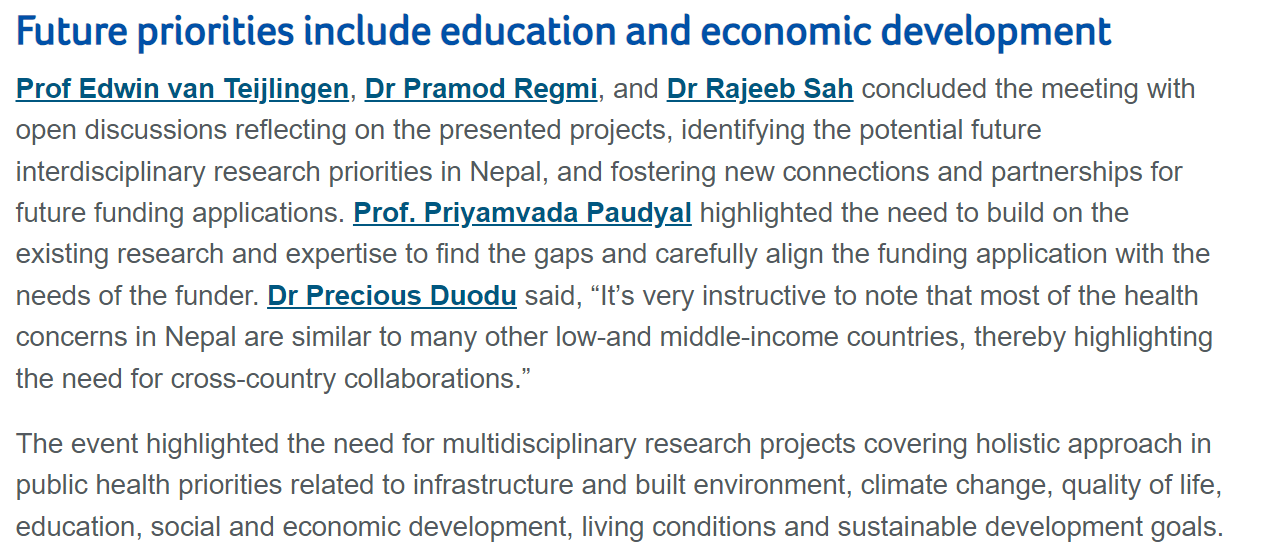











 New CMWH paper on maternity care
New CMWH paper on maternity care From Sustainable Research to Sustainable Research Lives: Reflections from the SPROUT Network Event
From Sustainable Research to Sustainable Research Lives: Reflections from the SPROUT Network Event ECR Funding Open Call: Research Culture & Community Grant – Apply now
ECR Funding Open Call: Research Culture & Community Grant – Apply now ECR Funding Open Call: Research Culture & Community Grant – Application Deadline Friday 12 December
ECR Funding Open Call: Research Culture & Community Grant – Application Deadline Friday 12 December MSCA Postdoctoral Fellowships 2025 Call
MSCA Postdoctoral Fellowships 2025 Call ERC Advanced Grant 2025 Webinar
ERC Advanced Grant 2025 Webinar Update on UKRO services
Update on UKRO services European research project exploring use of ‘virtual twins’ to better manage metabolic associated fatty liver disease
European research project exploring use of ‘virtual twins’ to better manage metabolic associated fatty liver disease